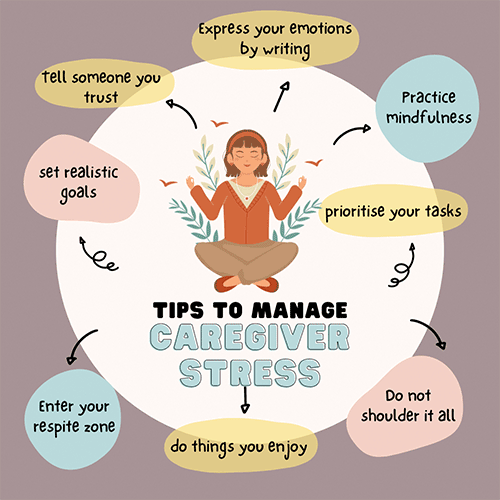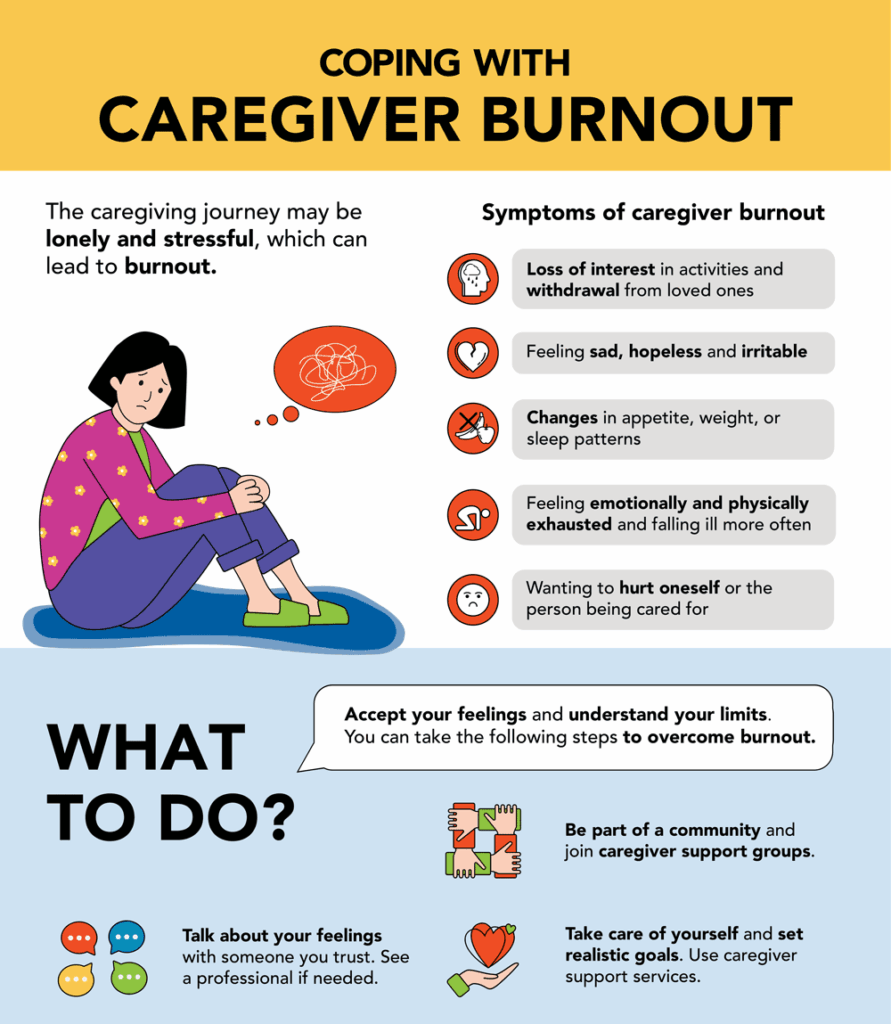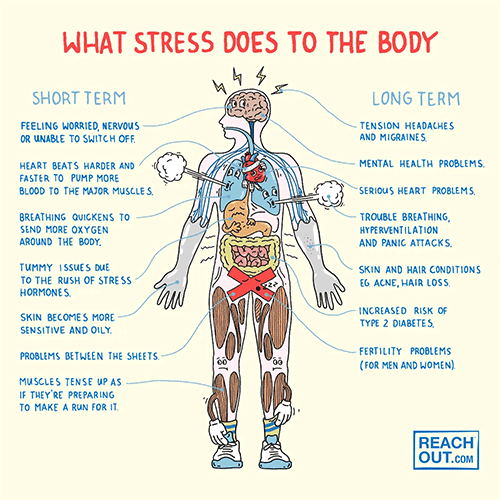
Caregiver stress
Stress is a natural way our body copes with triggers in the environment. Along the caregiving journey, changes involving your loved one or yourself can trigger stress. When caregiving demands feel overwhelming, and personal resources like time, energy or support are limited, this stress can build up.
Over time, it can affect both your physical and mental health. You may have increased inflammation, difficulty remembering things, and feel more irritable easily. Being able to manage caregiver stress is essential for your own well-being and helps you provide more sustainable care for your loved one.
Symptoms of prolonged caregiver stress
Below are some effects that prolonged stress can have on your physical and emotional well-being.
Caregivers’ stress checklist
You can check your caregiver stress with the Zarit Burden Interview Screen (ZBI-4) tool.
The following list of statements reflect how you may feel when taking care of another person. After reading each question, indicate how often you experience the feelings listed by circling the number that best corresponds to the frequency of these feelings.
| Question to ask yourself | Score |
| Do you feel that because of the time you spend with your relative that you don’t have enough time for yourself? | Never (0) Rarely (1) Sometimes (2) Quite frequently (3) Nearly always (4) |
| Do you feel stressed between caring for your loved one and trying to meet other responsibilities (work/family)? | Never (0) Rarely (1) Sometimes (2) Quite frequently (3) Nearly always (4) |
| Do you feel strained when you are around your relative? | Never (0) Rarely (1) Sometimes (2) Quite frequently (3) Nearly always (4) |
| Do you feel uncertain about what to do about your relative? | Never (0) Rarely (1) Sometimes (2) Quite frequently (3) Nearly always (4) |
| Total score: |
If your score is ≥8, you are likely to be experiencing high caregiving burden which measures the extent to which caregivers perceive that caregiving has had an adverse effect on their emotional, social, financial, physical and spiritual functioning.
To help you cope better, read on to learn some tips to manage it, and where to get support suitable for your needs.
Managing caregiver stress
Main principle to note:
Any activities that can divert your attention away from the stressful situation will reduce stress

Most people think relaxation is only about clearing your mind, but it is about observing and understanding things to overcome negativity and cultivate constructive thoughts. Embrace your emotions as they are natural and part of who you are. Express them through writing or telling someone you trust such as your family or friends or even a healthcare professional you are in contact with for your loved one’s care. You can always reach out for help during your caregiving journey.
Caregiver burnout and ways to cope with it
Caring for a loved one who is unwell can be emotionally, physically, and mentally exhausting. This can lead to caregiver burnout, where you feel overwhelmed and exhausted from the stress of caregiving. You may feel unsupported and unappreciated, and neglect your own self-care, leading to depression and loss of interest in caring for yourself and your loved one.

Source: AIC x SG Enable Infographics on Self-care
For more information about avoiding caregiver’s burnout, you can read this guide. Seek professional help if you are feeling burnout. Use this wayfinding tool to find relevant support services near you.
You can participate in caregiver programmes that provide you with skills to practice self-care throughout your caregiving journey.
Helplines for you to call if needed
If you are experiencing a crisis
An emotional crisis is a state of overwhelming distress that disrupts an individual’s ability to cope, often triggered by significant life events such as loss or trauma.
| Service | Helpline |
|
SOS 24 hours Offers emotional support and crisis intervention for individuals in distress, aiming to prevent suicide and promote mental well-being |
1767 |
|
National Mindline 1771 24 hours Offers fast, anonymous, and free mental health support, whether you’re seeking advice or brief counselling. |
Call 1771 / Text 66691771 |
|
AMP Helpline Monday – Friday | 10.00am – 5.00pm Offers culturally sensitive mental health support for the Malay/Muslim community for those in distress |
6416 3960/ 6416 3961 |
| If you are experiencing a crisis related to abuse, please reach out to the following helplines for support: | |
|
National Anti-Violence and Sexual Harassment Helpline (NAVH) 24 hours Offers support and assistance to individuals facing violence or harassment, providing guidance, resources, and referrals to appropriate services |
1800-777-0000 |
|
Women’s Helpline Monday – Friday | 10.00am – 6.00pm Provides support and assistance to women facing issues such as domestic violence, sexual harassment |
1800-777-5555 |
If you need specific caregiving advice
| Service | Helpline |
|
Caregivers Support Care Line Monday – Friday | 9.00am – 5.00pm (except PH) For caregivers of seniors or persons with disabilities |
6804 6555 (available on WhatsApp) |
|
The Seniors Helpline Monday – Friday | 9.00am – 5.00pm For caregivers of seniors |
1800-555-5555 |
|
Mindfull Community Helpline Monday – Friday | 9.00am – 6.00pm For caregivers who are caring for persons living with dementia and living with mental health issues |
6460 4400 |
|
Club HEAL Monday – Friday | 9.00am – 5.00pm For caregivers who are caring for persons living with dementia and living with mental health issues |
6899 3463 |
|
Dementia Helpline Monday – Friday | 9.00am – 6.00pm For caregivers who are caring for persons living with dementia and living with mental health issues |
6377 0700 |
|
Caregiver Hotline Monday – Friday | 9.00am – 6.00pm For any caregiver |
8343 3224 |

